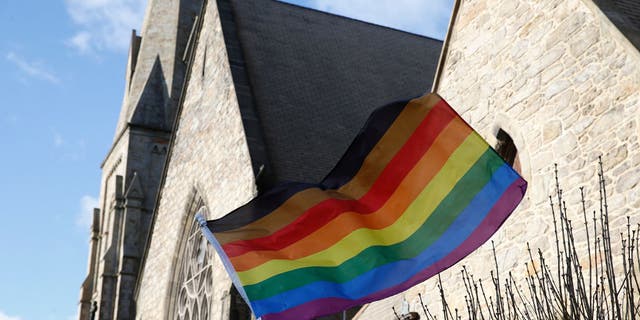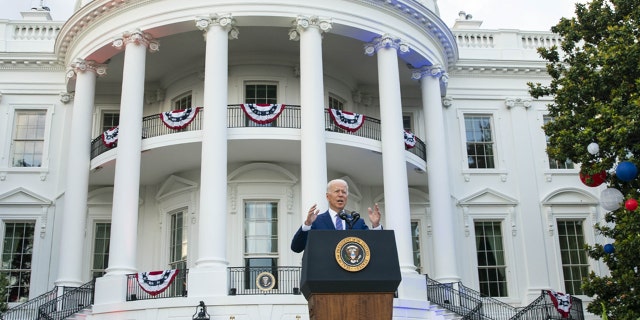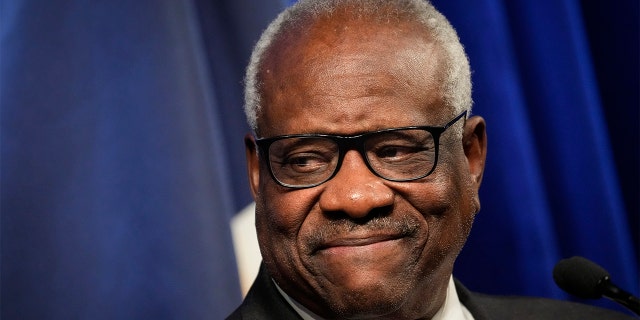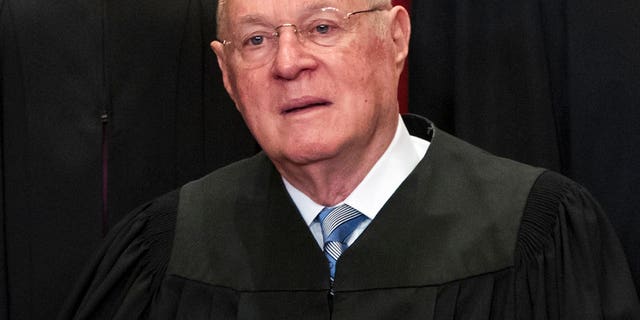Lorie Smith is a business owner, who says she puts her Christian faith above financial profit.
However, her efforts to manage both have put Smith in conflict with Colorado officials over the limits of workplace speech, an issue the Supreme Court will address in high-profile oral arguments on Monday.
At issue is a private company’s refusal to create any website for a same-sex wedding, despite a state’s “public accommodation” law prohibiting discrimination on the basis of sexual orientation.
Legal questions over compelled commercial speech, expressive content and societal tolerance will again place the nine-member bench squarely in the middle of a culture war debate – with competing claims involving religion and gay rights.
RESPECT FOR MARRIAGE ACT: WHY RELIGIOUS LIBERTY DESERVES PROTECTION AND MY AMENDMENT WILL PROVIDE IT
Smith runs 303 Creative, a for-profit online graphic design firm, and seeks to expand her portfolio to include custom wedding celebration websites.
However, in keeping with her religious tenets, she does not want to publish any such sites for gay or lesbian couples. Smith preemptively claims she would be prevented from posting a disclaimer on her own homepage about those views.
“Nobody should be punished or compelled or silenced simply because their beliefs are different from the government,” Smith told Fox News Digital.
However, supporters of the law say it is necessary, especially after the high court in 2015 allowed same-sex marriage.
A man holds a U.S. and a rainbow flag outside the Supreme Court in Washington after the court legalized gay marriage nationwide.
(AP)
“If 303 Creative prevails here, then any business that can be characterized as expressive, and that’s a lot of businesses, can start putting up signs saying no Jews served, no Christians served, no Blacks served,” said ACLU National Legal Director David Cole. “We had that practice during Jim Crow, I don’t think we want that practice back again.”
The court specifically will not address whether that Colorado law also violates the artist’s sincerely-held free exercise religious rights. However, the underlying faith-based claims will likely be a major part of the justices’ consideration of the law’s constitutionality.
This is the latest in a series of recent First Amendment cases with religious connotations the court’s conservative majority has agreed to tackle in recent years.
Additionally, it is the second time the Colorado law itself will get high court scrutiny. Masterpiece Cakeshop owner Jack Phillips refused to create a custom a wedding cake for a Lakewood, Colorado gay couple. The justices’ 2018 ruling gave the baker a partial victory, saying that the Colorado Civil Rights Commission had acted with anti-religious bias.
Now, the Supreme Court may be prepared to issue a broader opinion on the constitutional rights enjoyed by private business owners nationwide.
Smith’s story
Smith said her passion for graphic design began at age 5, when she began watching her mother operate her boutique.
“I had the unique privilege of being in that environment, watching firsthand what it looks like to run and own a business,” Smith told Fox News Digital.

Lorie Smith, owner of 303 Creative at center of Supreme Court free-speech case.
(Credit: ADF )
“I love the process of getting to know them before we actually get to creating,” Smith said of her business relationships. “I have a very thorough process of getting to know who my clients are. I want to know what they’re passionate about, why they’re asking me to help them… Is it a good fit? Is what they’re looking for something that I can do and provide? Am I passionate about it?”
After years in corporate marketing and design, the Colorado native opened her own studio, named for the “303” area code of metro Denver.
Smith says she enjoys the personal touch she can offer clients, but says she cannot create every message they may want. She holds to her Christian doctrine in believing marriage is the union of one man and woman, and says her custom websites would celebrate marriage, within her faith’s traditional views.
US BISHOPS CONCERNED GAY MARRIAGE BILL WILL PUNISH ‘REASONABLE AND SINCERE’ RELIGIOUS OBJECTORS
However, Smith fears being sanctioned by the state if she articulated her views on 303Creative.com, and filed a pre-enforcement challenge to Colorado’s law. An unpublished sample page would read in part that designing same-sex marriage sites “would compromise my Christian witness and tell a story about marriage that contradicts God’s true story of marriage— the very story He is calling me to promote.”
Other content she would refuse to design include views promoting atheism, gambling or violence.
The Arizona-based Alliance Defending Freedom is representing Smith in court, and did the same for Phillips in his appeal.
303 Creative has served LGBTQ+ clients, but Smith says her lawsuit is not about gay marriage or gay customers, just her asserted right to resist expressing ideas through websites that undermine deeply-held religious beliefs.

An LGBTQ+ flag flies over Union United Methodist Church in the South End of Boston on Jan. 5, 2020.
(Jessica Rinaldi/The Boston Globe via Getty Images)
“It certainly rocked me. I mean, how… can wanting to design and create a wedding through God’s lens be something that’s punishable in the state of Colorado in this country?” she said. “I recognize that not everybody holds the same view on marriage as I do, and that’s OK because what I’m asking the court to do is protect those people’s rights as well. To protect their right to think and speak freely.”
Colorado’s arguments
State officials say the Colorado Anti-Discrimination Act (CADA) is being applied fairly to all businesses, making it illegal to refuse public services based on “disability, race, creed, color, sex, sexual orientation, marital status, national origin, or ancestry.”
“Companies cannot turn away LGBT customers just because of who they are,” said Colorado Attorney General Phil Weiser, a Democrat who just won re-election. “We will vigorously defend Colorado’s law, which protect all Coloradans by preventing discrimination and upholding free speech.”
Much of the oral argument is expected to turn on what Smith would be allowed to digitally publish, and whether it amounts to constitutionally-protected viewpoints or instead, is the kind of conduct the government may regulate.
In its brief with the high court, the state says its law is about equal access, and does not seek to suppress any message Smith’s business might wish to express.
“The Company is free to decide what design services to offer and whether to communicate its vision of marriage through biblical quotes on its wedding websites,” according to Colorado officials. “The Act requires only that the Company sell whatever product or service it offers to all regardless of its customers’ protected characteristics.”
“Over many decades, and against many challenges, this [Supreme] Court has repeatedly affirmed the state’s ability to prevent ordinary sales discrimination. It should not abandon this important and longstanding principle now.”

President Biden speaks during a Fourth of July event on the South Lawn of the White House in Washington, D.C., U.S., on Sunday, July 4, 2021.
(Photographer: Sarah Silbiger/Bloomberg via Getty Images)
Lower courts have upheld CADA, saying the state has compelling reasons to protect the “dignity interests” of marginalized groups.
The Supreme Court in 2020 ruled the 1964 Civil Rights Act protects LGBTQ+ employees from discrimination based on sex.
The Biden administration, in its brief supporting Colorado’s public accommodation law, says the high court’s precedents appropriately provide that status-based protection to gay, lesbian, and transgender customers as well.
Faith fractures
It is a bedrock principle of the Constitution’s First Amendment: “Congress shall make no law respecting an establishment of religion or prohibiting the free exercise thereof.” Tension between those government and individual principles has been especially acute in the past six decades, as judges have been asked to ensure – when protecting one side, they do not go too far in violating the other. The Supreme Court has interpreted such laws be enforced in a manner that is neutral toward religion.
RESPECT FOR MARRIAGE ACT: THE VERY DEFINITION OF FREEDOM AND LIBERTY
That has led to a mixed record of sorts on a range of such disputes, with the justices often employing a default case-by-case determination. The high court has allowed some religious-themed displays on public property, while banning others. So too when it comes to legislative and school prayers; and taxpayer funds to religious organizations, even for secular purposes.
In 1971, the high court established its three-prong “Lemon” test, named for one of the parties in the case. That embedded legal standards in the relationship between church and state.
However, the approach has had its critics. In 1992, the late Justice Antonin Scalia tweaked his colleagues for their “wavering” application of precedent.
“Like some ghoul in a late-night horror movie that repeatedly sits up in its grave and shuffles abroad, after being repeatedly killed and buried, Lemon stalks our Establishment Clause jurisprudence once again,” he wrote. “It is there to scare us (and our audience) when we wish it to do so, but we can command it to return to the tomb at will.”

Associate Supreme Court Justice Clarence Thomas speaks at the Heritage Foundation on Oct. 21, 2021, in Washington, D.C.
(Drew Angerer/Getty Images)
Justice Clarence Thomas was more succinct in 2011, saying the court’s jurisprudence on the matter was “anyone’s guess.”
Evolving law
By wading again into a politically-charged debate, the justices will have to confront recent decisions on both gay rights and religious liberty: a 2015 landmark opinion legalizing same-sex marriage nationwide; and its separate 2014 decision affirming the right of some companies to act on their owner’s faith by refusing to pay for certain forms of contraception for its workers.
Then in 2018, a narrow, nuanced ruling in the first high court challenge to Colorado’s law. A 7-2 majority favored baker Phillips, who sought a sincere faith-based exemption to the state’s anti-discrimination law, when choosing his clientele.
The court deftly sidestepped core questions over a business owner’s religion and free speech rights. Both this and the website case are also limited in scope, dealing with firms having an “artistic expression” component not applied to most employers.
Separate appeals over wedding photographers could reach the justices in coming months, that may address the religious liberty questions.
“These disputes must be resolved with tolerance,” said Justice Anthony Kennedy in the baker’s case, “without undue disrespect to sincere religious beliefs and without subjecting gay persons to indignities when they seek goods and services in an open market.”

In this June 1, 2017, file photo, Supreme Court Associate Justice Anthony M. Kennedy joins other justices of the U.S. Supreme Court for an official group portrait at the Supreme Court Building in Washington. The 81-year-old Kennedy said June 27, 2018, that he is retiring after more than 30 years on the court.
(AP Photo/J. Scott Applewhite, File)
Kennedy’s announced his retirement days later, and the court’s current 6-3 conservative majority has since become increasingly sympathetic to religious liberty claims.
In 2019, a large concrete veterans memorial in the shape of a Christian cross on government property was allowed to stand. This past June, a public high school football coach who had prayed on the field after games in the presence of students was allowed to get his job back.
As Justice Neil Gorsuch wrote in the coach’s case, “The Constitution and the best of our traditions counsel mutual respect and tolerance, not censorship and suppression, for religious and nonreligious views alike.”
The current dispute over Smith’s appeal is expected to draw a similar ideological divide, pitting individual constitutional rights against a state’s anti-discrimination laws.
Chief Justice John Roberts predicted the current legal dilemma in his gay marriage dissent: “Hard questions arise when people of faith exercise religion in ways that may be seen to conflict with the new right to same-sex marriage.”
CLICK HERE TO GET THE FOX NEWS APP
The case is 303 Creative LLC v. Elenis (21-476). A ruling can be expected by June 2023.
Fox News’ Brianna Herlihy contributed to this report